University of California, Riverside
Get to Know:
Chris Morgan
Alumni Spotlight
Chris Morgan shares what it’s like writing several of the “Fast & Furious” films and why, on the road to success, you should never forget your A.B.C.s — Always Be Cool
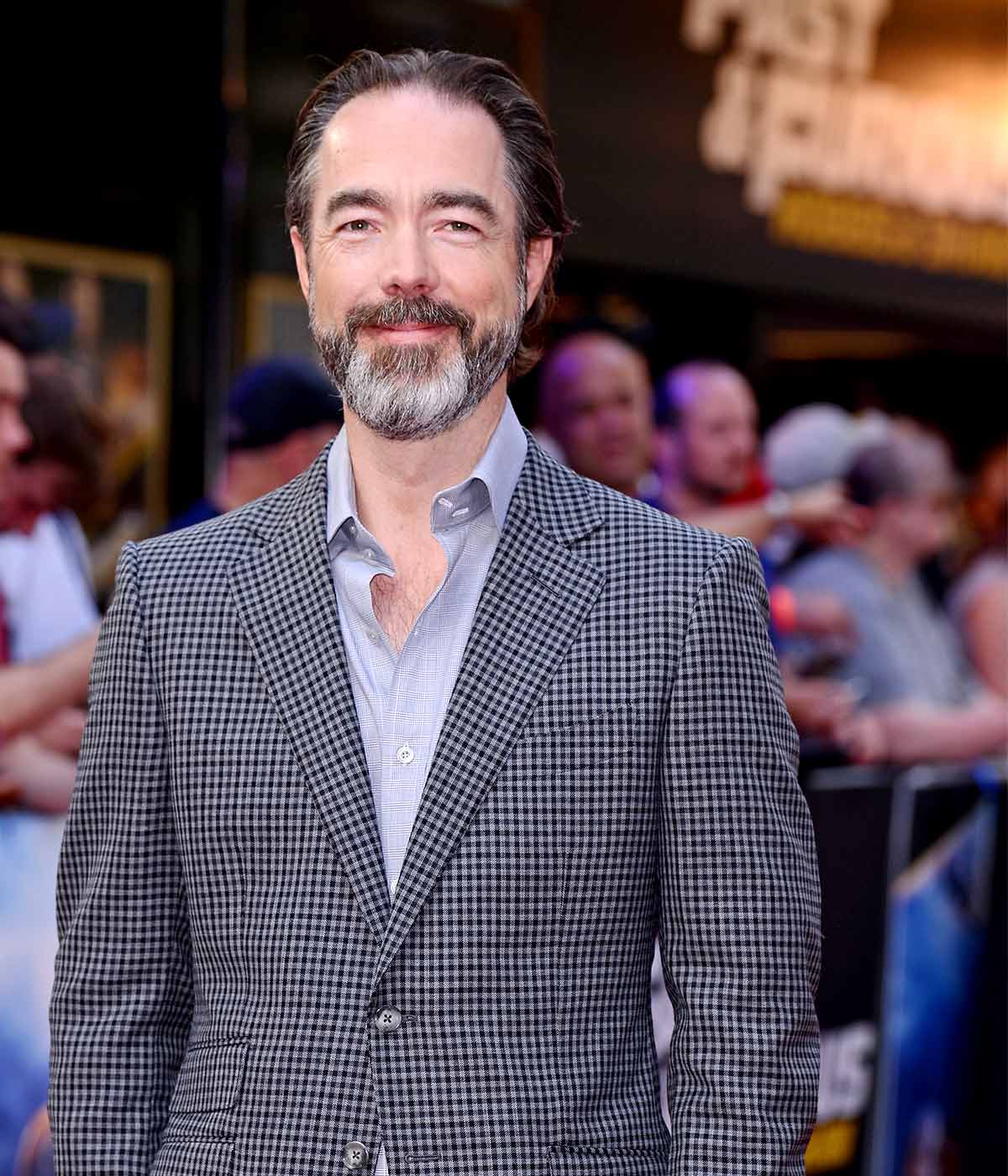
Chris Morgan (Getty Images)
UCR alumnus Chris Morgan grew up on a diet of “The A-Team,” “Magnum P.I.,” and “Jaws.” When he was 10, he saw “Raiders of the Lost Ark” in a Los Angeles movie theater, staying put in his seat while the credits rolled so he could enjoy it a second time. In his teens and 20s, he worked in a video store, gaining expert film knowledge as he critiqued the latest releases with customers and colleagues. In retrospect, he admits he probably should have studied film as a UCR student. Instead, he chose to major in English, switching to political science when he realized his writing genre was more “Mad Max” than Penguin Classics.
After a serendipitous break into the film industry, Morgan has built a career as a screenwriter and producer, including for the “Fast & Furious” movies — Universal’s biggest franchise and the seventh-highest grossing film series, bringing in a combined $7.3 billion at the box office. In addition to dreaming up car chases, heists, and bad-guys-turned-good for the “Fast” series since 2006’s “The Fast and the Furious: Tokyo Drift,” Morgan’s writing credits include the 2004 film “Cellular,” the 2008 film “Wanted,” the Fox crime drama “Gang Related,” and the upcoming Amazon action-adventure film “Red One,” starring Dwayne Johnson and Chris Evans.
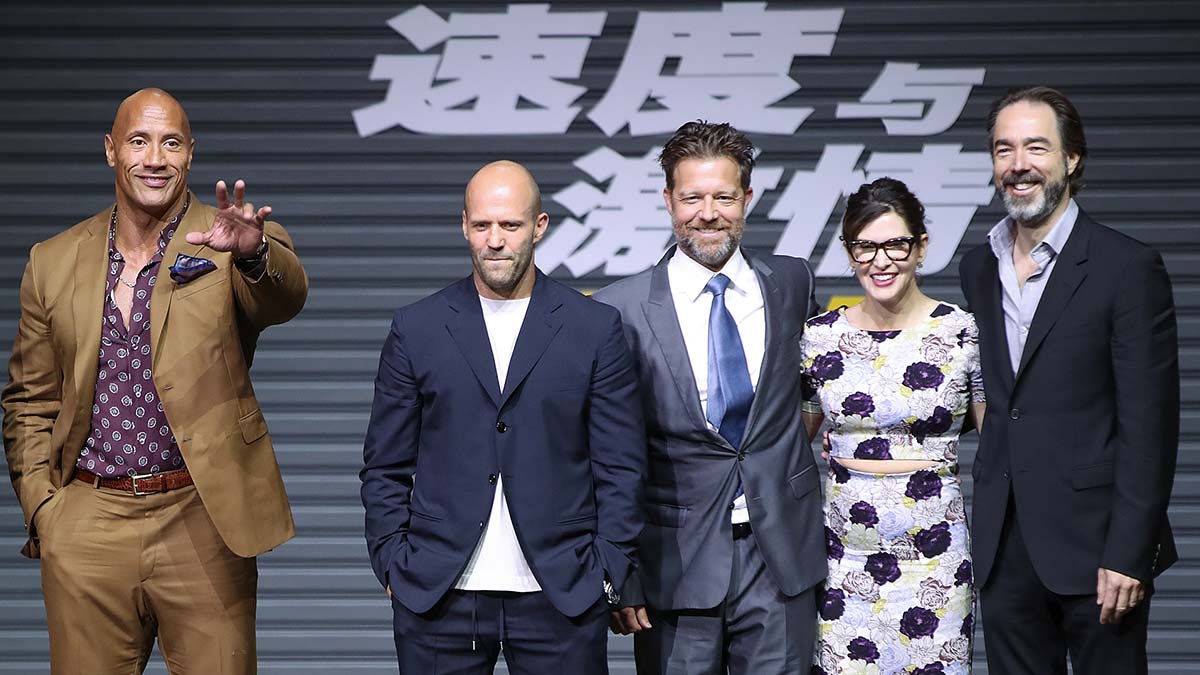
Left to right: Dwayne Johnson, Jason Statham, David Leitch, Kelly McCormick, and Morgan at a "Fast & Furious: Hobbs & Shaw" press conference in China in 2019. (Getty Images)
Q: You’ve been a screenwriter and/or producer for the “Fast & Furious” movies since 2006. Can you give us a glimpse of a typical day-to-day in your movie-making shoes?
A: Well, there’s different modes depending on where we are in the process.
When we’re selling the idea of the next film to the studio, I’m writing a “reading draft” to convince them to spend the money. Typically, it’s written to be quick and easy to read, to flow from one page to the next so you can feel the velocity of the plot and action building. It’s also written to be super colorful so the reader can imagine visually what the movie will feel like as the audience experiences it in the theater. It’s not a technical draft, or a budget draft. It’s really more of a sales tool so the studio can get a sense of the rollercoaster ride you’re hoping to take the audience on.
So, let’s say the studio likes what they’ve developed with you and you’ve gotten the green light. Now we’re in pre-production. This, for me, is where the writing gets technical. Now we look at every page with an eye to our budget. Things that are too expensive get cut or reimagined. This is also where I’ll spend a lot of time speaking with our director, actors, stunt coordinator, etc. We’ll closely examine our shooting locations and revise based on soundstage availability and country rebates. We’re very focused on giving the best film experience and making our budget in this phase.
Providing we survive that round, now we’re into production and actually shooting a movie. I speak with pretty much everyone every day during this phase. Every morning, I speak with the director and the actors and the studio about what we’ll be shooting. Often things will have changed. Lighting setups, location availability, scene revelations, etc. Actors will have new insights and will want to make sure what they’re feeling is reflected in the pages. You’re a little in survival mode here and you have to always be ready to go. I’ve rewritten entire multipage scenes in the middle of an exterior location when inspiration hit one of our collaborators and everyone had to wait while we tailored the scene to fit the new moment and raced the setting sun. It can be tense and scary, but you have to embrace your colleagues and fight for what’s best for the audience together.
Once the movie’s wrapped, you’re officially in post-production. This means that now you’re mostly in the editing room with your director and the editor, who is completely integral to the storytelling process, looking for the cleanest and most impactful way to tell the story, or to see if there’s anything we’ve missed. When we’re feeling pretty good, we test the film with an audience and take their reactions into consideration for additional photography. This means writing new scenes or rewriting bits on old ones to fill the gaps or underscore core emotional moments or new ideas.
Then you picture lock, help with the promotional tour where you can, and hope the movie does well when it comes out. That’s the basic life cycle of a movie for a writer and producer.
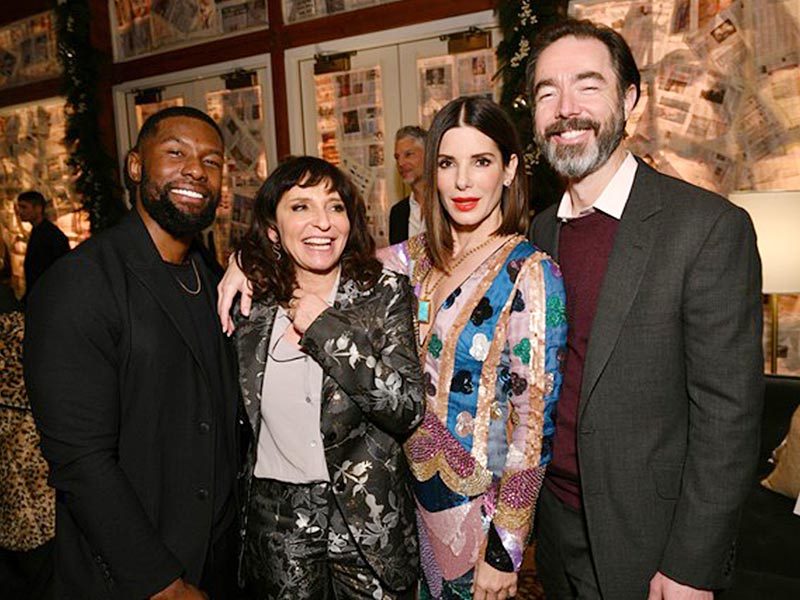
Left to right: Trevante Rhodes, Susanne Bier, Sandra Bullock and Morgan at the Bird Box premiere in New York City. (Courtesy of Chris Morgan)
Q: You loved action films and TV series as a kid and worked in a video shop for several years before getting your Hollywood break. You also earned a bachelor’s degree in political science from UCR in 1995. Tell us a bit about why you chose UCR and that particular major.
A: I remember receiving my letter and the sheer joy of being accepted into UCR. I knew it was a great school and was located close enough to home, which would let me keep my job to help pay for tuition and still be near friends and family. Initially, I signed up as an English major and very nearly flunked out. And rightly so, by the way. Though I appreciate the great literary works, I’m about as far from a literary writer as you can be. Most of my sentences have “Boom!” or “Ka-wham!” in them, so I probably should’ve switched to film — though I thought that a career in that was way too unrealistic. Instead, I changed to poli sci because I was interested in world affairs, the effect of history on people — looking back, basically the stories of life. Working on papers in that arena was not as grammatically disciplined and more about presenting ideas and building viewpoints, which tended to fit my style better and let me find my rhythm with school there. Go Highlanders!
Q: You wrote your first screenplay long before you had an agent or were on a movie company’s payroll. Did you initially view writing as just a hobby or did you always have your sights set on breaking into the movie business?
A: I never considered it earnestly as a career, even though I have a writer in my family. My mom published 18 novels over the years to help put her three kids through college — all while running a day care out of her house. She’d write for an hour each day when the babies she was caring for would all go down for their midday nap. That’s some pretty remarkable writing discipline. She’d find the little gaps in time between whatever else she had to do, stealing moments to write because she loved it. It was really inspiring to me growing up, but as a viable career path, it seemed daunting and mercurial and nearly impossible to fully support a family on.
But I’ve always loved movies and stories, and working at the video store only honed that. I got to see what films people enjoy and talk to them about why. I got to have conversations about movies all day long, which might be my favorite thing to do on the planet. And between customers, suddenly I’d find myself scribbling down scenes and ideas for a story on a yellow notepad at the front desk — and before long, it became my first screenplay. I did it because I was enjoying the process, not because I had a deadline or a goal or anyone was expecting anything. It was a labor of love alone, and I think that’s the secret to the best writing.
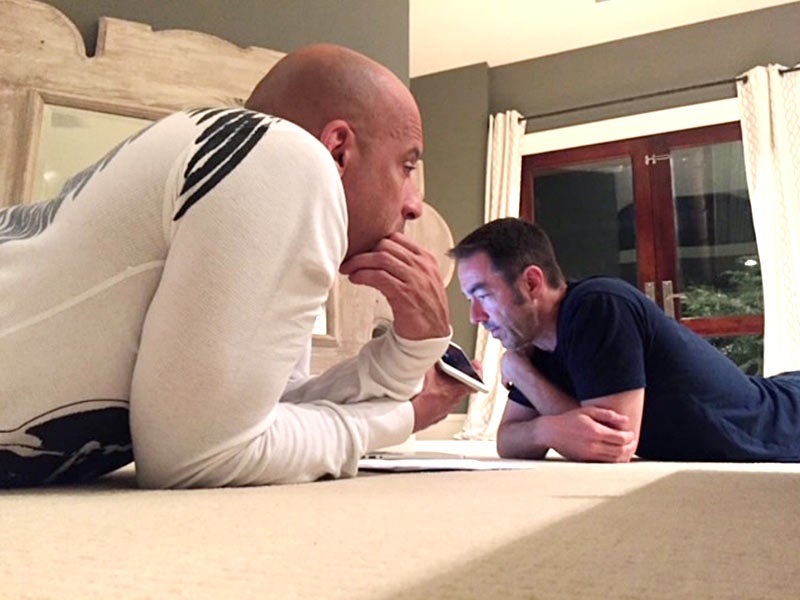
Vin Diesel and Morgan working on a scene for “The Fate of the Furious”. (Courtesy of Chris Morgan)
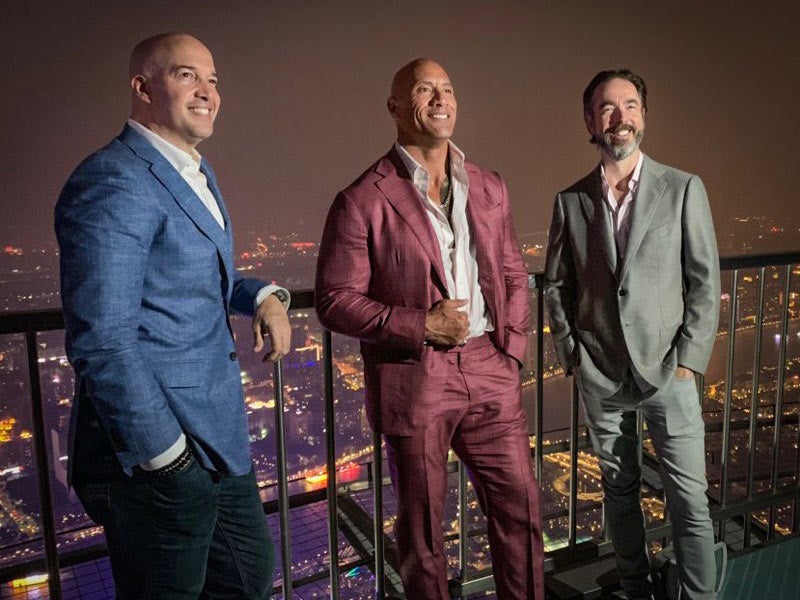
Morgan (right) with actor Dwayne Johnson and producer Hiram Garcia. (Courtesy of Chris Morgan)
Q: You’ve talked about your interest in writing for the “Fast” films stemming not from a love of cars, but from your love of the characters in the first few films — “bad guys” who stick together and stand for something good. Who was your favorite character to bring to life and why?
A: That’s a Sophie’s choice I’m not capable of making. I’ve been lucky enough to draft off the talent of many other incredible writers. From the original “The Fast and the Furious,” Gary Scott Thompson, David Ayer, and Erik Bergquist. From “2 Fast 2 Furious,” Michael Brandt and Derek Haas. Combined, their talent gave us the heart of the franchise: Dom, the character whose unbreakable code is so steadfast that the gravity of the “Fast” world revolves around him; and Brian, who is the audience in this world — everything he experiences, the audience sees the events through his eyes and perceptions. Letty and Mia. Roman and Tej, and much, much more.
As a fan, I felt so lucky to be able to play in the sandbox they created and felt a real responsibility to steward the amazing characters they created to the best of my ability. And then to expand it out with each subsequent entry, introducing Han — who we rewrote the entire franchise’s chronology for because he’s just so damn cool; Gisele, our tough-as-nails addition to our amazing cast of strong female characters; and then kicking the door open with the ultimate bad-ass lawman, DSS Special Agent Luke Hobbs. The entire Shaw family: Deckard, Owen, Hattie, and matriarch Magdalene “Queenie” Shaw. (I mean, writing for Helen Mirren?!?! C’mon. What a dream!) Cyber wizards Cipher and Ramsey. Spy king Mr. Nobody. Sean Boswell, Leo, and Santos. Baby Brian. The list goes on and on—a world of characters created in collaboration with my favorite actors, directors, producers, and studio execs. Writing for each character gives a different kind of satisfaction. It’s impossible to pick a favorite.
Q: Most of the films you’ve written and produced are action films. If you had the opportunity to go out of your comfort zone and write a script for a completely different genre, what would it be and why?
A: Horror for sure. If I’m at home at night watching a film, it’s generally a horror movie. I’ve been a huge fan of the genre ever since I was a kid, staying up late watching them with my older brother. I was raised on Romero and Raimi and Argento and Hooper and Friedkin. And there are so many incredible filmmakers out there taking it to the next level today: James Wan, Jordan Peele, Ari Aster, Karyn Kusama, Andy Muschietti. I’d love a chance to work with them on something terrifying. It would make me beyond happy to add one great, reeeeally scary horror film to the world before I lock the typewriter back in its case and throw away the key.
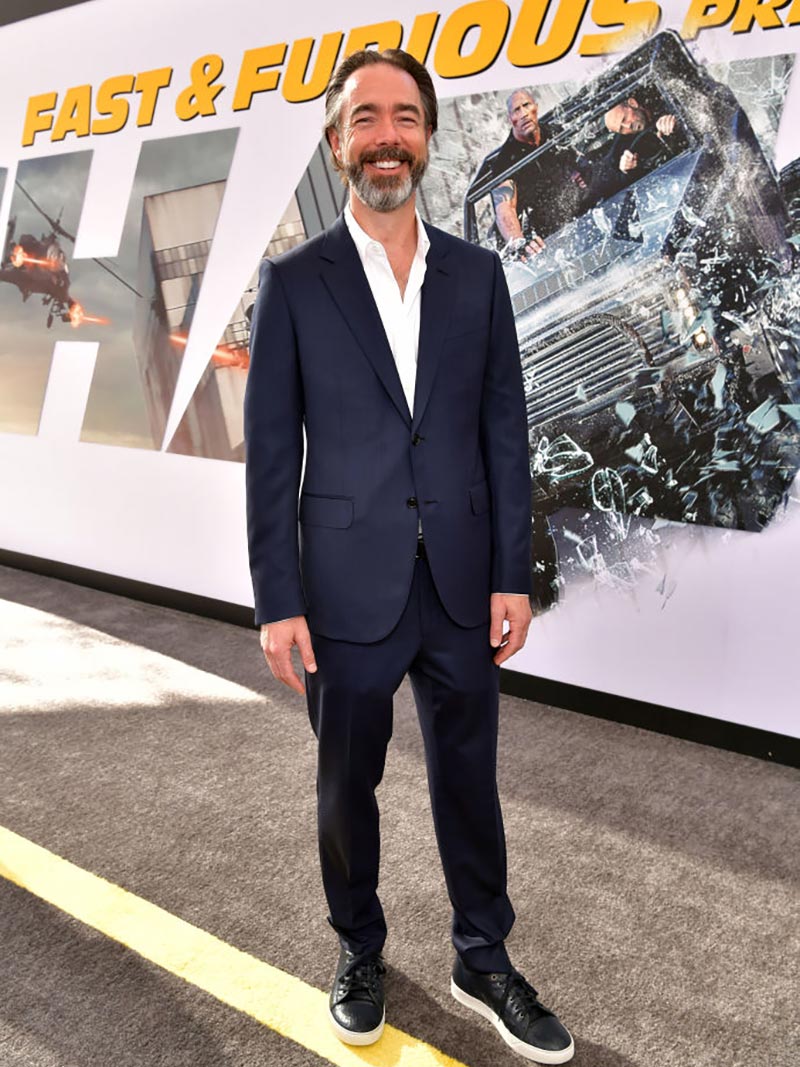
Morgan at the premiere of Universal Pictures’ “Fast & Furious Presents: Hobbs & Shaw” in 2019. (Getty Images)
Q: What career accomplishment or achievement are you most proud of?
A: The thing I’m most proud of isn’t a career moment, but being a small part of a very emotional, shared human experience during the filming of “Fast 7.” The world stopped instantly after the tragic loss of Paul Walker, literally one of the best, kindest, and most talented human beings on the planet. Everyone came together to mourn, to grieve, to remember. We all talked and connected and shared. And speaking with his family, we all came to the same conclusion that finding some way to finish the film with hope felt like something Paul would want. Being part of that moment, watching everyone link arms and come together in the most genuine and supportive way, despite unfathomable loss, was beyond inspiring. The “Fast” team has always been a family — but I’ll always remember how brightly their strength and love shone then.
Q: Were there any important people or experiences from your time at UCR that have had a meaningful impact on you or your career? If so, who and how?
A: I took one creative writing class as a student at UCR, and it helped me learn the importance of being open to flow and discovery in the initial pass — but that 90% of writing is rewriting. Also, in recent years, I’ve gotten to know Stu Krieger, who is an amazing teacher and had asked for me to come speak to his class. I’ve been impressed with how passionate he is to go above and beyond teaching students the practical keys to success in the film and entertainment industry today.
Q: What are some of your favorite memories from your time at UCR? Are you still in contact with any people or organizations you were part of as student?
A: I loved my time at UCR, though I wish I had taken more advantage of all the opportunities and groups the school had to offer. I was too shy and not focused enough to reach out or investigate it, and regret that still, all these years later. That’s why I love the opportunity to speak about it here. If this interview encourages one student to join a group, be more social, be a little more invested in what the school has to offer them, then mission accomplished.
Q: What advice would you give a UCR student considering a career in the entertainment industry? Is there anything you wish someone would have told you at the start of your career?
A: Two things:
First, BE READY FOR OPPORTUNITY. As I mentioned, I wrote my first screenplay sitting at the front desk of a video store between helping customers. A short while later, I got a gig as a production assistant on a film. While I was there, another assistant named Wayne Billheimer — who has since become one of my very best friends in the world — saw a script sticking out of my bag and asked what project I was reading. When I told him it was my own script that I was working on, he asked to read it. Days later, when he handed it back, I asked him what he thought of it and he smiled and shrugged and said, “It was okay.” The project ended and I went back to my job at the video store.
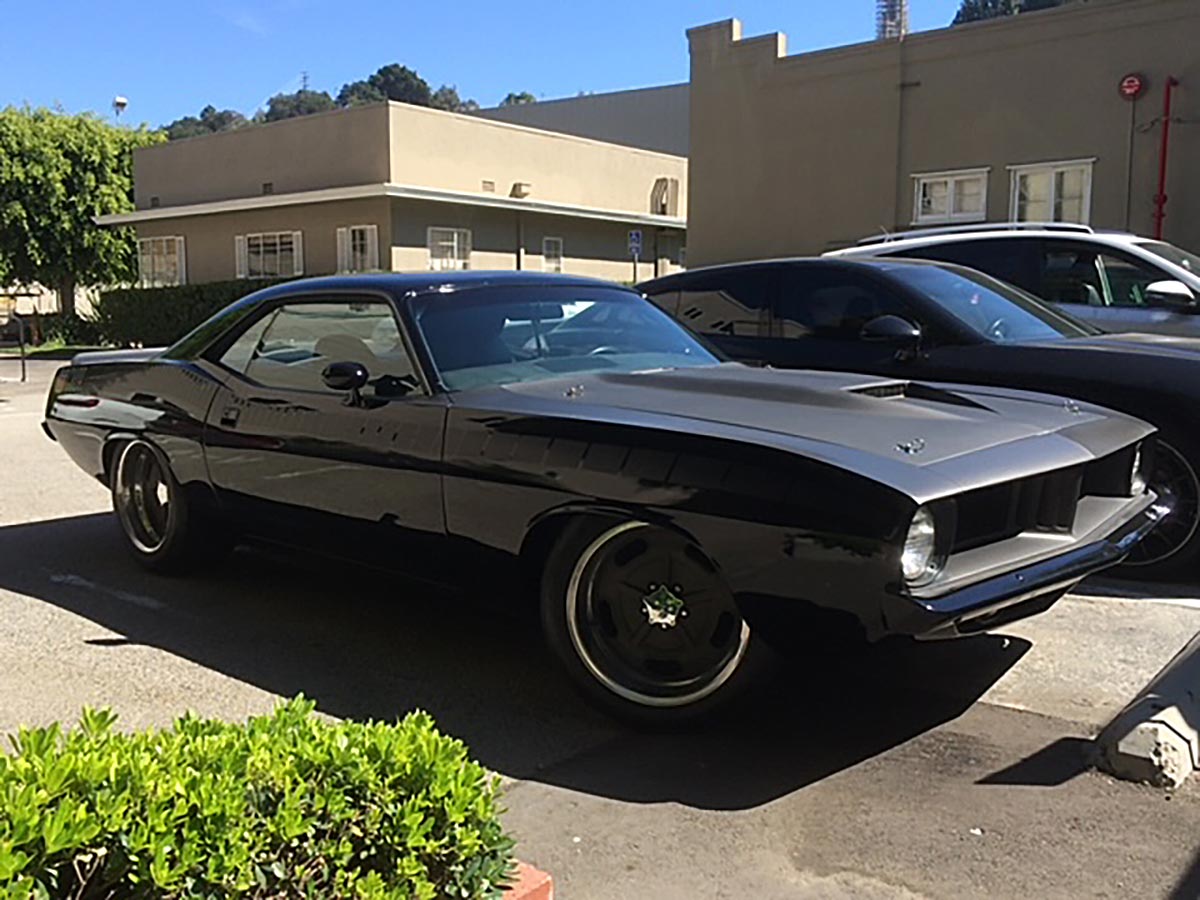
A 1973 Plymouth Barracuda, Letty’s car in “Furious 7,” given as a thank you gift to Morgan from Universal Studios. (Courtesy of Chris Morgan)
Months later, the phone at the video store rings and it’s Wayne, who said he was now working as an assistant to a director and he kept thinking about my script and asked if I’d mind if he showed it to the director. I said, “Of course!” — then heard nothing for months. When the phone rings again, this time it’s the story editor at DreamWorks, who said she just read my script and asked me to come in for a meeting that day. I did. And I didn’t end up selling the script. But the story editor (Andrea McCall) was so kind, and liked my writing, and out of the goodness of her heart, referred me to an agent and a lawyer. And that’s how I got my start. People were extraordinarily thoughtful and generous and changed the course of my life with their kindness — but none of that would’ve happened if I hadn’t done the work first, when no one was asking for it. In that moment, thankfully, I was ready for the opportunity that came along. So, the lesson is: write when no one is asking you to. Do the work and be ready for when the opportunity presents itself. Because sometimes all it takes is a glimpse of a script in a bag to change your life forever.
Second, and equally important, “A.B.C.” Always Be Cool. No matter what, no matter the situation, be a good and decent human being to everyone. This job has a lot of stresses, particularly during production, but there is nothing so important that you can’t take a moment, be calm, and treat everyone with respect. The person bringing coffee today is the super producer/writer/director/actor of tomorrow. Help each other. This is an industry of artistic collaboration, and a rising tide raises all ships. Be the rising tide. Support one another. A kind word and giving credit where credit is due costs you nothing — but might change another person’s life. Be a legend. Be cool.
Q: What’s next for you? Are there any projects you are working on that you are particularly excited about?
A: With the WGA and SAG strike, all work has stopped. The focus right now is supporting writers and actors 100% in our existential struggle to maintain a fair working wage — basically to keep writing and acting as viable careers as the landscape of our industry shifts — and to begin to look forward and regulate the use of A.I. in those fields. But prior to the strike, we wrapped “Red One” — a Dwayne Johnson/Chris Evans Christmas action film directed by Jake Kasdan that I’m incredibly excited about. And once the studios and the guilds come to terms and the strike is hopefully behind us all, I’m excited to dive into the next chapter of “Hobbs” for Universal. And after that, who knows? Sky’s the limit … as long as it goes BOOM! Or KA-WHAM!